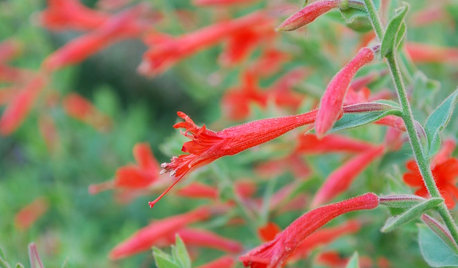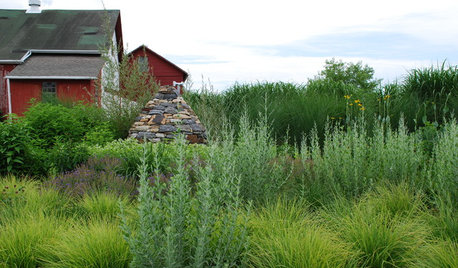well water has high iron & manganese - is this a problem?
gardenerkarin999
12 years ago
Related Stories

WOODKnotty and Nice: Highly Textured Wood Has a Modern Revival
Whether it's cedar, fir or pine, if a wood has a knot, it's hot
Full Story
BACKYARD STUDIOSSee Why This Architect's Office Has a Built-In Safety Net
A Maine backyard studio gets high marks for energy efficiency, and its safety-net hangout adds low-tech fun
Full Story
SUMMER GARDENING6 Water-Wise Perennials for Blazing High-Altitude Summers
Scorching weather and high elevations don't have to mean scraggly plantings. These blooms are as gorgeous as they are tough
Full Story
HOUZZ TVHouzz TV: This Dream Midcentury Home in a Forest Even Has Its Own Train
Original wood ceilings, a cool layout and, yes, a quarter-scale train persuaded these homeowners to take a chance on a run-down property
Full Story
LANDSCAPE DESIGNProblem Solving With the Pros: An Abundant Garden Stretches Its Means
Swaths of resilient, eye-catching plants thrive with little care or resources in the landscape of a Pennsylvania farmhouse
Full Story
REMODELING GUIDESOne Guy Found a $175,000 Comic in His Wall. What Has Your Home Hidden?
Have you found a treasure, large or small, when remodeling your house? We want to see it!
Full Story
COLORS OF THE YEARPantone Has Spoken: Rosy and Serene Are In for 2016
For the first time, the company chooses two hues as co-colors of the year
Full Story
MODERN ARCHITECTUREHouzz Tour: Arizona's Dialogue House Has Something New to Say
Get in on the conversation about this minimalist masterpiece in the Phoenix desert, remodeled by its original award-winning architect
Full Story
DECORATING GUIDES5 Pet Problems Solved by Design
Design-Friendly Ideas for Pet Beds, Bowls, Doors — and yes, the Litter Box
Full Story
REMODELING GUIDESThe Hidden Problems in Old Houses
Before snatching up an old home, get to know what you’re in for by understanding the potential horrors that lurk below the surface
Full Story





tsugajunkie z5 SE WI ♱
don555
Related Professionals
Willowick Landscape Architects & Landscape Designers · Woodinville Landscape Architects & Landscape Designers · Waterbury Landscape Contractors · Wilmington Landscape Contractors · Cockeysville Landscape Contractors · Commack Landscape Contractors · Hampton Bays Landscape Contractors · Kaneohe Landscape Contractors · Long Beach Landscape Contractors · Longview Landscape Contractors · Manhattan Landscape Contractors · San Rafael Landscape Contractors · Wailuku Landscape Contractors · Burleson Swimming Pool Builders · Conroe Swimming Pool BuildersNHBabs z4b-5a NH
goren